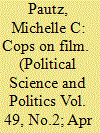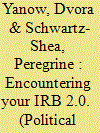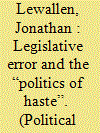|
|
|
Sort Order |
|
|
|
Items / Page
|
|
|
|
|
|
|
| Srl | Item |
| 1 |
ID:
146819


|
|
|
|
|
| Summary/Abstract |
With numerous recent incidents in which law-enforcement officers played a role in the deaths of citizens, there is a renewed focus on cops and their actions. Part of that discussion is related to the nation’s preconceived notions of cops and where those ideas might originate. Popular culture contributes to those images; this study explores one source of those images: film. More specifically, it investigates the image of law enforcement on the silver screen from 1984 through 2014. With a sample of 34 films and more than 200 cop characters, this study finds a mixed general depiction of law enforcement in movies but a positive depiction of individual cop characters. The prevalent descriptor of those characters was good, hard-working, and competent law-enforcement officers. This exploratory study informs broader discussions about the images of cops found in popular culture.
|
|
|
|
|
|
|
|
|
|
|
|
|
|
|
|
| 2 |
ID:
146824


|
|
|
|
|
| Summary/Abstract |
This essay corrects and updates one that was originally published in Qualitative & Multi-Method Research and, in a condensed version, in three other APSA Organized Section newsletters. Our research into IRB policy has shown that many political scientists are not familiar with some of its key provisions. The intent of the essay is to increase awareness of the existing policy’s impact on political scientific research and, in particular, on graduate students and junior faculty. We remain concerned that at present, faculty are leaving discussions of research ethics to IRBs (and their counterparts worldwide), whereas these Boards largely focus on complying with the regulatory details of governmental policy. Even though this essay seeks to clarify the latter, we remain convinced that research ethics ought to be vigorously taken up within disciplinary and departmental conversations.
|
|
|
|
|
|
|
|
|
|
|
|
|
|
|
|
| 3 |
ID:
146818


|
|
|
|
|
| Summary/Abstract |
Protest can be seen as a highly democratic expression of popular opinion. However, protest is also a non-representative, extra-institutional process for political change. In hybrid regimes, such as Ukraine, the legitimacy of effecting change through mass protest is a subject of debate. Because of the influence of mass protests in Ukrainian politics, individual views on the democratic legitimacy of protest are potentially important in perceptions of government legitimacy. Using original survey data from December 2013, this article finds that, whereas satisfaction with the functioning of democracy, partisanship, and the oft-cited regional divide are important determinants of approval for the Euromaidan protests, they do not influence how Ukrainians perceive the role of protest in a democracy. However, among those less committed to democracy, protest is more likely to be seen as illegitimate.
|
|
|
|
|
|
|
|
|
|
|
|
|
|
|
|
| 4 |
ID:
146825


|
|
|
|
|
| Summary/Abstract |
Evaluations of teaching effectiveness rely heavily on student evaluations of teaching. However, an accumulating body of evidence shows that these evaluations are subject to gender bias. Theories of leadership and role incongruity suggest that this bias should be especially prominent in large courses. This article examines publicly available data from two large political science departments and finds that female instructors receive substantively and significantly lower ratings than male instructors in large courses. The author discusses the implications of apparent gender bias in teaching evaluations for the professional success of female faculty. Findings of gender bias in evaluations in other fields also hold in political science and are particularly problematic in the evaluation of large courses.
|
|
|
|
|
|
|
|
|
|
|
|
|
|
|
|
| 5 |
ID:
146822


|
|
|
|
|
| Summary/Abstract |
Data access and research transparency (DA-RT) is a growing concern for the discipline. Technological advances have greatly reduced the cost of sharing data, enabling full replication archives consisting of data and code to be shared on individual websites, as well as journal archives and institutional data repositories. But how do we ensure that scholars take advantage of these resources to share their replication archives? Moreover, are the costs of research transparency borne by individuals or by journals? This article assesses the impact of journal replication policies on data availability and finds that articles published in journals with mandatory provision policies are 24 times more likely to have replication materials available than articles those with no requirements.
|
|
|
|
|
|
|
|
|
|
|
|
|
|
|
|
| 6 |
ID:
146817


|
|
|
|
|
| Summary/Abstract |
Legislative error is an important and understudied element of the policy process. Even simple clerical mistakes—if unnoticed before enactment—can lead to ambiguity about a law’s meaning, spark political battles concerning rulemaking and implementation, and involve the courts in statutory interpretation. Understanding how and why error occurs can help us better understand how political institutions are intertwined in the design, enactment, and implementation of public policy. This article analyzes the sources of legislative error using data on corrected legislation in the US Senate from 1981 to 2012. The author finds that Senate drafting error is related to unified control of Congress and new majority parties, inexperienced committee members, and committee workload. In addition to bringing in different perspectives and preferences, elections can affect a legislature’s ability to draft clear, error-free statutes.
|
|
|
|
|
|
|
|
|
|
|
|
|
|
|
|
| 7 |
ID:
146823


|
|
|
|
|
| Summary/Abstract |
To allow researchers to investigate not only whether a paper’s methods are theoretically sound but also whether they have been properly implemented and are robust to alternative specifications, it is necessary that published papers be accompanied by their underlying data and code. This article describes experiences and lessons learned at the Quarterly Journal of Political Science since it began requiring authors to provide this type of replication code in 2005. It finds that of the 24 empirical papers subjected to in-house replication review since September 2012, only four packages did not require any modifications. Most troubling, 14 packages (58%) had results in the paper that differed from those generated by the author’s own code. Based on these experiences, this article presents a set of guidelines for authors and journals for improving the reliability and usability of replication packages.
|
|
|
|
|
|
|
|
|
|
|
|
|
|
|
|
| 8 |
ID:
146820


|
|
|
|
|
| Summary/Abstract |
A researcher’s “pipeline” refers to the progression of papers from the idea stage to the publication stage. Tenure-track faculty and graduate students often are advised that a busy pipeline is the way to tenure. However, beyond the simple encouragement to “work harder,” “write more,” and “publish more,” not much direction is given to junior scholars regarding how they should think about and manage their research pipeline. How does one develop a large number of papers from their first stages to the pages of respected journals? This article discusses the author’s system for pipeline management. The system works (1) by separating the difficult exercise of publishing a paper into eight manageable stages; and (2) by organizing a set of papers using these steps according to a practicable timeline.
|
|
|
|
|
|
|
|
|
|
|
|
|
|
|
|
| 9 |
ID:
146828


|
|
|
|
|
| Summary/Abstract |
This article analyzes the effectiveness of an international, interdisciplinary simulation of an ongoing trade negotiation. It thoroughly describes the simulation, provides links to background information for public use, and offers suggestions on ways to further strengthen the learning outcomes achieved.
|
|
|
|
|
|
|
|
|
|
|
|
|
|
|
|
| 10 |
ID:
146821


|
|
|
|
|
| Summary/Abstract |
As publishing demands increase, so does the availability of open access predatory publishing options masquerading as reputable peer-review outlets. This article cautions against the broader consequences of predatory publishing and suggests means to control their influence.
|
|
|
|
|
|
|
|
|
|
|
|
|
|
|
|
| 11 |
ID:
146826


|
|
|
|
|
| Summary/Abstract |
Political science is one of the most popular majors for law school applicants, and studies show that political science majors have high rates of law school admission. In addition, many political science departments have a pre-law advisor. However, little is known about the status of pre-law advising on college campuses or the views of pre-law advisors on political science. This article presents the results of a February 2015 survey of 313 college pre-law advisors from across the United States. The authors discovered that the majority of pre-law advisors hold faculty appointments and serve as pre-law advisors without additional compensation or course releases. Pre-law advisors also rate political science as the second-best major, among 14 popular majors, for preparing students for both admission to and academic success in law school. These findings should be of interest to political scientists as well as other faculty and administrators who are concerned with pre-law advising.
|
|
|
|
|
|
|
|
|
|
|
|
|
|
|
|
| 12 |
ID:
146827


|
|
|
|
|
| Summary/Abstract |
Large numbers permeate political life, and students of political science can expect to encounter a wide range of numbers in newspaper articles, course readings, and statistics. Recent research in cognitive psychology demonstrates that American adults make systematic errors when comparing numbers in the millions, billions, and trillions. Political decisions made by voters often require weighing large quantities that range across many orders of magnitude, which is difficult without at least a basic understanding of relative magnitudes. If students also lack an understanding of large numbers, professors cannot meaningfully teach them about political phenomena involving such magnitudes. The authors designed and tested an exercise to improve students’ accuracy in dealing with large magnitudes, which had immediate and sustained effects on their political judgments about information involving large numbers.
|
|
|
|
|
|
|
|
|
|
|
|
|
|
|
|
|
|
|
|
|